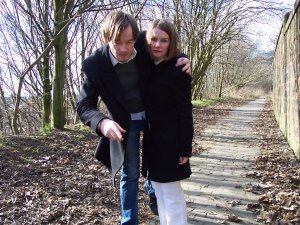Comrades in love, beauty and spirituality: Interview with Monica Queen and Johnny Smillie
by anna battista

“I really feel this record was a big challenge, in the concept, in how we wanted it to sound and, last but not least, vocally,” Monica Queen states on a dull Glasgow afternoon while we’re sitting in a West End café. Monica - ex-voice of Thrum, guest vocalist on Belle & Sebastian’s ‘Lazy Line Painter Jane’ and on James Grant’s more recent works - has just released her new solo album, the follow-up to Ten Sorrowful Mysteries (Creeping Bent, 2002).
Co-written and produced by ex-Thrum guitarist Johnny Smillie, Return of the Sacred Heart (Vertical Records) extends the main religious themes of her first album and gives Queen’s vocal skills a new dimension. “Johnny came up with songs that were extremely far-reaching in the key they were written,” Monica recounts, “we felt that with this album we wanted to capture an emotive and melancholic atmosphere and for us that only comes if the voice really tries to reach out and grab something.” The new album turned into a bit of a surprise for both Monica and Johnny. “The record seemed to take a life of its own,” she remembers, “and we found it difficult at times to keep up with it: everyday we knew that in the little studio in our home there was something special going to happen when everything was switched on.”
Return of the Sacred Heart opens with the soulful ‘Fly Away’, featuring Jim White, who, a while back, asked Queen and Smillie to work with him on a track for his new record, a track that Johnny defines as “long, dark and avant-garde”. White returned the favour with ‘Fly Away’: “Jim is a wonderful character,” Monica states, “once you get in his company after a few times, he begins to relax and you begin to relax and to talk as well. He’s a very smart and intelligent fellow and you tend not to say very much or too much before you get to know him because you don’t want to make a fool of yourself. It was a pleasure to be able to work with him.”
All the songs on Return of the Sacred Heart deserve and demand the listener’s attention: ‘The Passion’ is a hieratical experience with an ethereal background chorus; the title track is heartbreaking; ‘Holiest Night’ is a poetic track; ‘Déjà Vu’ is tinged with nostalgia. Throughout the record the music arrangements are sparse: most songs feature an acoustic guitar, giving in this way more space to Queen’s angelic voice, a mixture of grace, fragility and purity. “We spent time developing this style, where the guitar weaves around the vocals,“ Johnny explains, “we essentially create instrumentals, indeed we consider the vocals as just another instrument. There could almost be no lyrics in our works, because essentially our songs are instrumentals, we are influenced by instrumentals, by classical music for example.”
It took quite a while to this extraordinary musical duo to release the new album, but the long break between the two works wasn’t actually planned: Monica and Johnny had started working on it as soon as Ten Sorrowful Mysteries had been released. One of the reasons of the delayed release is their recent move to another record label. “We really had a wonderful time with Creeping Bent,” Monica recounts, “Douglas McIntyre did an absolutely fantastic job promoting the record and giving it to people that he thought would understand it: without Douglas probably there wouldn’t have been any Ten Sorrowful Mysteries, so we will be eternally grateful to him. He felt that Creeping Bent, though, might have not benefited us and he thought we should have moved to a label where we would have had more financial backing. We really didn’t want to leave Creeping Bent, but then Vertical Records were quite happy to put the record out in conjunction with Sanctuary and it seemed the right thing to do.”
Both Monica and Johnny feel happy about their new work and about their music, “Ten Sorrowful Mysteries was received very well, some reviewers thought it was a masterpiece and we certainly wouldn’t disagree with that,” Johnny says, “we feel that with this new album we have found our own sound, something unique to us, and we want to keep it.” “Ten Sorrowful Mysteries and Return of the Sacred Heart have the same elements between them,” Monica continues, “and if we felt that we were to make a more straight ahead guitar rock record, something a little more upbeat, we would go ahead and do it, but we would certainly retain what we’ve learnt from these two albums.”
Monica and Johnny’s partnership seems to be quite harmonious: even though in her career Monica has performed with many artists, she feels at one with Johnny. “I love what he brought to the records,” she claims, “I really couldn’t see myself wanting or needing to go off and working with other people. When I’m invited to sing on somebody’s record I take up the invitation of course, like it recently happened with James Grant: he is a wonderful person and we’ve become good friends, we meet up every now and then and share the philosophies of life, our loves and losses and disappointments.”
Apart from singing the beautiful ‘A Tale Best Forgotten’ on Grant’s I Shot the Albatross, Monica also appeared on his latest Holy Love and performed during his gigs. “James must be admired because he recognised that Monica would have been better to sing ‘A Tale Best Forgotten’, which is one of the best tracks he has ever written: there aren’t many people out there willing to sacrifice their own ego for the sake of making music,” Johnny states, “in the same way, Belle & Sebastian’s Stuart Murdoch, a great artist and a genius in himself, like James, recognised that Monica was good enough to fulfil the role of singer on ‘Lazy Line Painter Jane’.”
There is something, though, on which Monica and Johnny disagree and that’s their favourite song on Return of the Sacred Heart: if Johnny claims it’s the title track, Monica is for ‘Déjà vu’. “Vocally it was a big challenge and lyrically this is a wonderful track,” she explains, “hopefully it is not over-sentimental: it’s about looking back on childhood through adult life, that’s probably where the melancholy and nostalgia comes into that track. It’s also about looking back to a time when you felt everything was going well and seemed right, and it is also sung looking forward to something wonderful in mind.”
 For the duo there are no regrets left behind with Thrum. “We feel more complete as artists now,” Johnny claims, “though in being more complete there’s also the aspect of being less commercial. In Thrum there was a desire to be successful that was driving us, but I don’t know if we would have appreciated reaching that objective or not then. I suppose now we are pretentious, because we see ourselves as artists, whereas with Thrum we were basically a rock band, a really good dirty rock band and we loved that, it was great. We would probably do it again as a hobby, but we wouldn’t take it as really serious music.”
For the duo there are no regrets left behind with Thrum. “We feel more complete as artists now,” Johnny claims, “though in being more complete there’s also the aspect of being less commercial. In Thrum there was a desire to be successful that was driving us, but I don’t know if we would have appreciated reaching that objective or not then. I suppose now we are pretentious, because we see ourselves as artists, whereas with Thrum we were basically a rock band, a really good dirty rock band and we loved that, it was great. We would probably do it again as a hobby, but we wouldn’t take it as really serious music.”
Having left behind Thrum, also meant for them, leaving behind the local music scene with its excesses. “We used to drink a lot more when we were in Thrum,” Johnny remembers, “and you need to drink really A LOT to be part of the scene, but, frankly, we’re past that now.“ “I kind of get a bit envious of the local music community, because of their stamina to party 24/7,” Monica says, smiling, “I can’t do it anymore: our community consists of two people and that’s Johnny and myself and that’s as big as we probably want it to get.”
In their little ‘community’, two of the most listened artists are Mary Margaret O’Hara and Neil Young, but also Sigur Rós. “We listen to the radio a lot,” Johnny says, “in particular to the programme ‘Late Junction’ on BBC Radio 3, which is probably our main inspiration for this record. Their mix includes sacred choir music, folk music, world music, punk, rock, a bit of everything, but it’s all the best and it’s all interesting. Basically, we’ve been listening to a mix of things while working on Return of the Sacred Heart, including the Cocteau Twins, Polish composer Henryk Górecki, sacred music, Ennio Morricone, Emmylou Harris and old Scottish folk records.”
Monica and Johnny hope one day to fulfil a special dream: working with Daniel Lanois - “the most expensive producer in the world,” in Johnny’s words - or writing a soundtrack or collaborating with a classical composer such as James McMillan. “A soundtrack would lift your thought processes out of the pop sensibility and would bring in different elements of music, like classical or orchestrated music,“ Monica explains, “and a collaboration with a classical composer would actually be something completely new and extravagant and simply wonderful.”
Future aspirations, dreams and projects must wait, though: for the time being, Monica will have to concentrate on promoting the new album with gigs in Aberdeen, Glasgow and Edinburgh. “Music means connecting with other people,“ Johnny states, “and I think that those who have beauty, love and spirituality in their make-up will definitely connect with our sound.” Comrades in love, beauty and spirituality, there are some excellent news: you have just found the music for you.
{www.monicaqueen.co.uk, www.verticalrecords.co.uk, www.sanctuaryrecordsgroup.co.uk}
Copyright (c) 2005 erasing clouds |
|